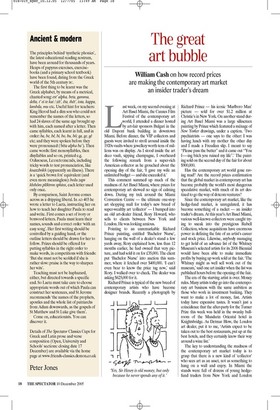Ancient & modern
The principles behind ‘synthetic phonics’, the latest educational reading nostrum, have been around for thousands of years. Heaps of papyrus exercises, exercisebooks (and a primary school textbook) have been found, dating from the Greek world of the 5th century BC.
The first thing to be learnt was the Greek alphabet, by means of a metrical, chanted song: est’ alpha, beta, gamma, delta, t’ ei te kai / zêt’, êta, thêt’, iota, kappa, lambda, mu etc. Useful hint for teachers: King Herod had a dim son who could not remember the names of the letters, so had 24 slaves of the same age brought up with him, each named after a letter. Then came syllables, each learnt in full, and in order: ba, be, bê, bi, bo, bu, bô; ga, ge, gê etc; and they were spoken before they were pronounced (‘bêta alpha ba’). Then came words: first monosyllables, then disyllables and so on, printed e.g. O:dus:seus, Le:on:to:me:nês, including tricky words to test pronunciation, like knaxzbrikh (apparently an illness). There is a ‘quick brown fox’ equivalent (and even more meaningless): bedu zaps khthôm plêktron sphinx, each letter used only once.
By comparison, Saint Jerome comes across as a dripping liberal. In AD 403 he wrote a letter to Laeta, instructing her on how to teach her daughter Paula to read and write. First comes a set of ivory or boxwood letters. Paula must learn their names, sounds and correct order ‘with an easy song’. Her first writing should be controlled by a guiding hand, or the outline letters should be drawn for her to follow. Prizes should be offered for putting syllables in the right order to make words, in competitions with friends: ‘But she must not be scolded if she is rather slow: praise is the way to sharpen her wits’.
Teaching must not be haphazard, either, but directed towards a specific end. So Laeta must take care to choose appropriate words out of which Paula can construct her sentences, and St Jerome recommends ‘the names of the prophets, apostles and the whole list of patriarchs from Adam downwards, as the gospels of St Matthew and St Luke give them’.
Come on, educationists. You can discover it.
Details of The Spectator Classics Cups for Greek and Latin prose and verse composition (Open, University and Schools’ sections: closing date 17 December) are available via the home page at www.friends-classics.demon.co.uk
Peter Jones

























































 Previous page
Previous page